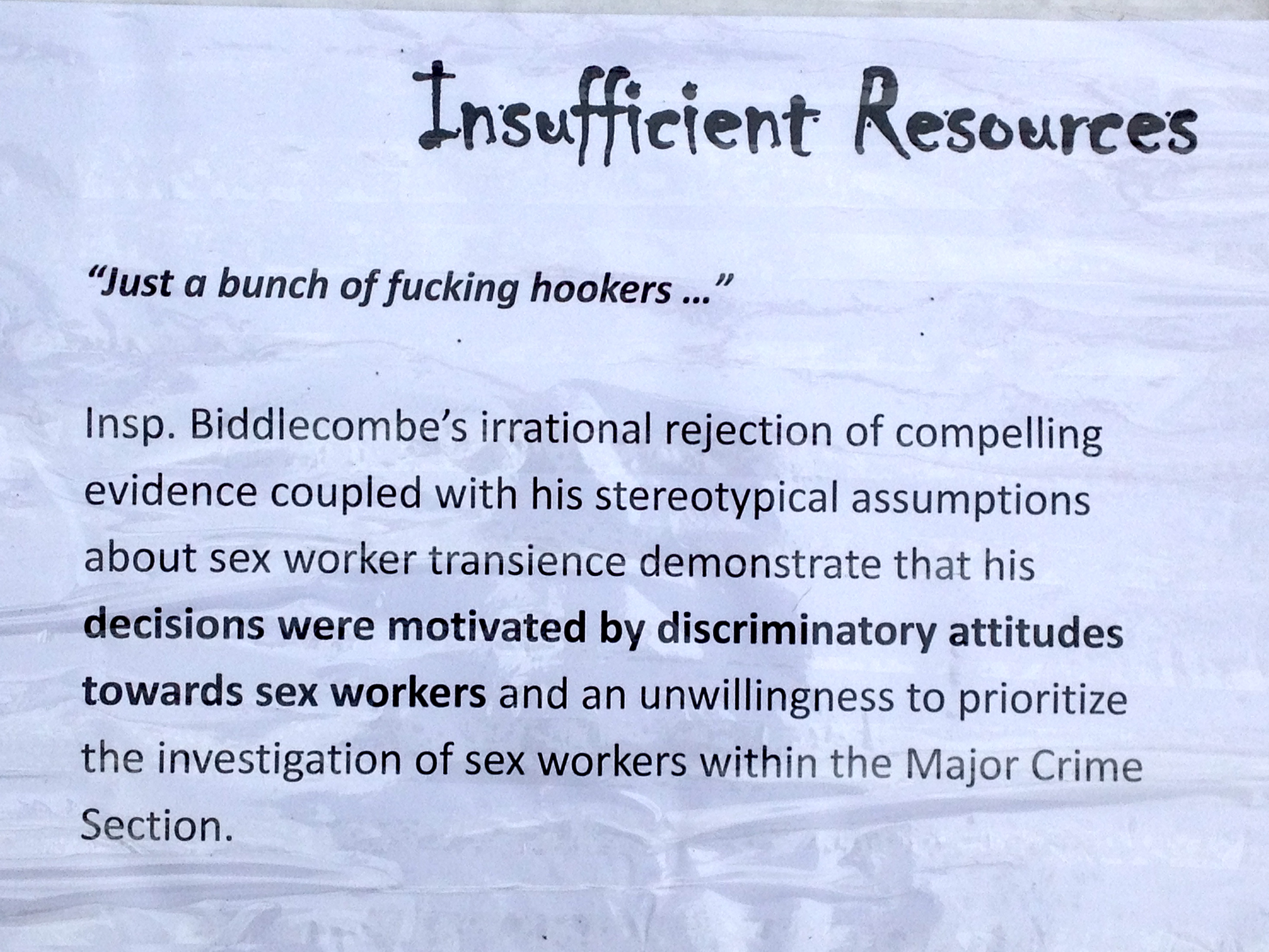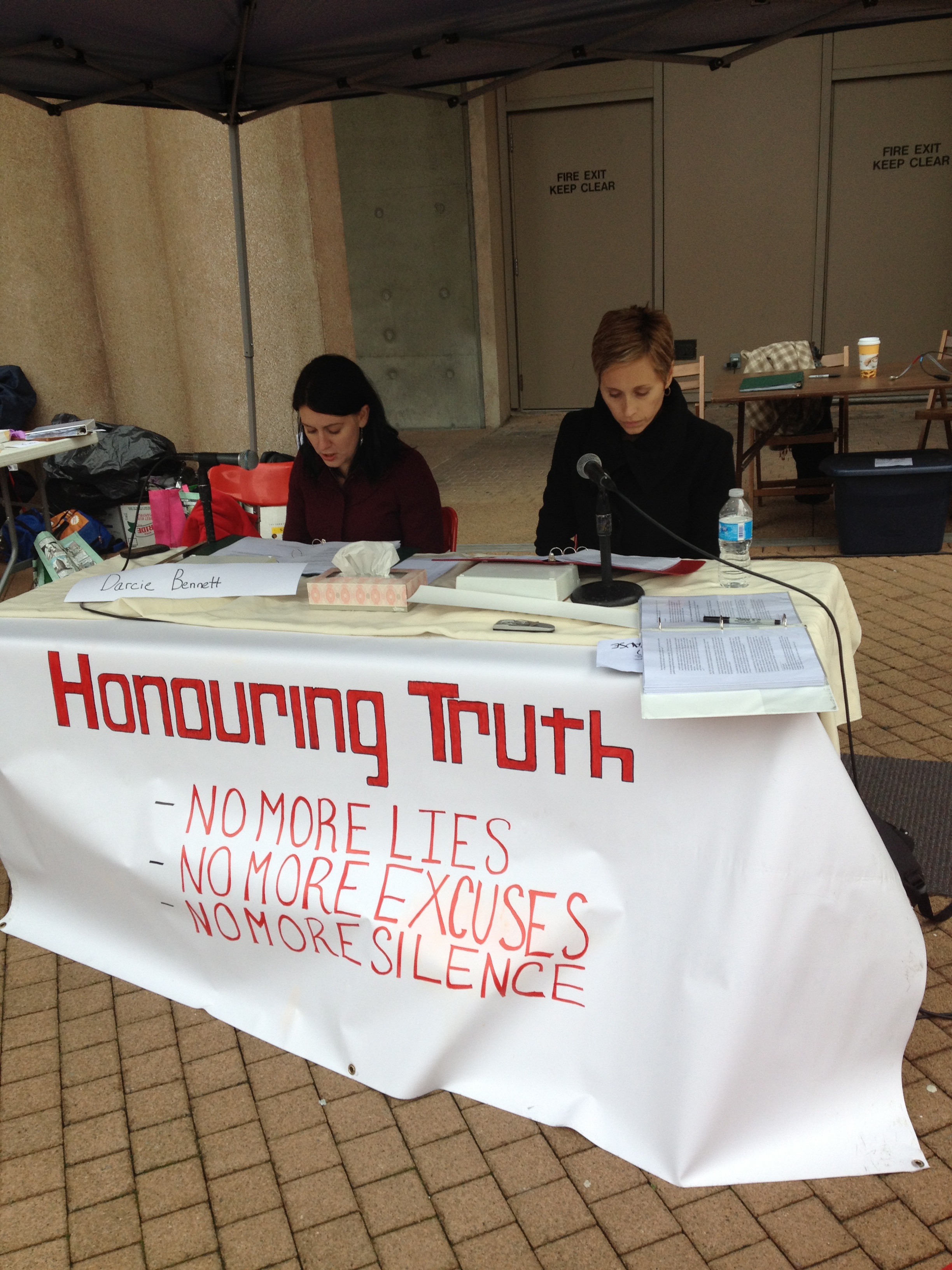I find many of my days are spent trying to keep up with the fast pace of life. Like many of us, I race from meeting to meeting, try to keep on top of my list of things to write and research and do, and manage what feels like a bottomless email inbox. And then there are those important times when all of that busyness is interrupted. When something grabs you, time stands still and there is nothing that matters as much as what is happening in that moment. Yesterday afternoon was one of those times.
Get Updates
Using the law as a catalyst for positive social change, Pivot Legal Society works to improve the lives of marginalized communities.
After a busy day of meetings and deadlines, I left the Pivot office to head down to the Vancouver Public Library. Darcie and I had been invited to participating in an event called, “Honouring Truth,” a public reading of the submission prepared by Jason Gratl for the Missing Women Commission of Inquiry. The first part of the submission's provocative title, Wouldn’t Piss On Them If They Were On Fire: How Discrimination Against Sex Workers, Drug Users and Aboriginal Women Enabled A Serial Killer, is a direct quote from the book manuscript of Det/Cst. Shenher, who testified in the Inquiry and wrote how senior VPD management harboured negative attitudes and biases against sex workers.
As I approached the event, I saw compassionate faces, tear-filled eyes, red umbrellas*, and I heard these words,
"The notion that missing women were not victims of foul play because “they were just missing, like we know addicted hookers will do”, captures both the factually inaccurate stereotype of the lives of survival sex workers and the way that the derisive use of the term “hooker” influences and supports the reliance on those stereotypes."
As I listened, I moved around the crowd, saying hello and giving hugs to the many good friends who were there, and then took a seat next to Darcie to hear more from Laura Track, a lawyer with West Coast LEAF, who was the reader at that point in the afternoon.
"Det/Cst. Shenher puts the discriminatory attitudes of senior managers in this way in her April 7, 2004 statement to Deputy Chief Lepard: “I would hear that certain managers like Unger I was told would say they were ‘just a bunch of fucking hookers.” But I found most people in the VPD were not judgmental like that; that attitude wasn’t an overall prevailing problem. What I encountered the most was just denial, that if we just ignore it long enough and look like we’re doing something it will go away.”
 Women took turns reading the submissions to an enthralled and chilly audience. It was incredibly powerful to hear the words – DECEPTION… DISCRIMINATION… DENIAL… LIES… STEREOTYPES… BIAS… SUPPRESSION OF INFORMATION - read out loud by women, many of whom are long time activists who have made major contributions in the fight for safety and rights for sex workers in Vancouver. Others were family members of missing and murdered women, many of whom experienced the discrimination and denial documented in the report when they reached out police for help finding their loved ones.
Women took turns reading the submissions to an enthralled and chilly audience. It was incredibly powerful to hear the words – DECEPTION… DISCRIMINATION… DENIAL… LIES… STEREOTYPES… BIAS… SUPPRESSION OF INFORMATION - read out loud by women, many of whom are long time activists who have made major contributions in the fight for safety and rights for sex workers in Vancouver. Others were family members of missing and murdered women, many of whom experienced the discrimination and denial documented in the report when they reached out police for help finding their loved ones.
I was somewhat breathless when it was my turn to read.
"To say that Vancouver Police senior management were biased against sex workers and hence failed to deploy sufficient resources to protect them is not to say that any VPD member consciously wanted sex workers to be killed, beaten or raped. It is only to say that the disappearance of sex workers from the public eye was consistent with what the law and the  community demanded of the Vancouver Police. The lack of resources given to Project Amelia was attributable to discriminatory attitudes and bias against sex workers and drug users."
community demanded of the Vancouver Police. The lack of resources given to Project Amelia was attributable to discriminatory attitudes and bias against sex workers and drug users."
As I read the words into the microphone, I felt so much sadness and anger. I thought about the many ways in which our community and the systems around us tragically failed the missing and murdered women. I thought about my experience as the lawyer representing sex worker serving organizations, who were shut out of an Inquiry that was supposed to lead to meaningful and lasting systemic change on behalf of the exact women they serve every day. I thought about the conversations I had just last week with sex workers who told me that there has been little change in the attitudes of police and in the criminal justice system overall, and they would still find it very difficult to report violence to the police. 
I looked up from the words I was staring at on the paper in front of me, and looked around at the friends and allies that were huddling together on that cold autumn day. I took my sadness and anger and dealt with it in the only way that I know how – by renewing my commitment to continue the fight for rights and safety for sex workers, women who use drugs and marginalized women everywhere. I also felt enormous gratitude for the incredible and dedicated community within which I carry out this work. As I walked away after the event, one of my favourite quotes from Arundhati Roy came to mind:
“Another world is not only possible, she is on her way. On a quiet day, I can hear her breathing.”
- Katrina
P.S. big thanks to Kerry Porth and Esther Shannon for having the vision for this event and for making it happen. It was an honour to be part of it.
* The red umbrella is the international symbol of sex workers’ rights.



